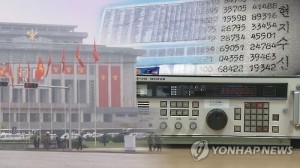- California Assembly OKs highest minimum wage in nation
- S. Korea unveils first graphic cigarette warnings
- US joins with South Korea, Japan in bid to deter North Korea
- LPGA golfer Chun In-gee finally back in action
- S. Korea won’t be top seed in final World Cup qualification round
- US men’s soccer misses 2nd straight Olympics
- US back on track in qualifying with 4-0 win over Guatemala
- High-intensity workout injuries spawn cottage industry
- CDC expands range of Zika mosquitoes into parts of Northeast
- Who knew? ‘The Walking Dead’ is helping families connect
N. Korea sends radio broadcast of new encrypted numbers ahead of key anniv.
SEOUL, April 14 (Yonhap) — North Korea on Friday sent a radio broadcast of a new combination of mysterious random numbers believed to be coded orders to its spies operating in South Korea, one day ahead of late state founder Kim Il-sung’s 105th birthday, one of its key anniversaries.

This undated image capture from Yonhap News TV shows a building in Pyongyang and mysterious numbers presumed to be a broadcast for North Korean spies operating in South Korea. (Yonhap)
The North’s propaganda station Radio Pyongyang began broadcasting the messages at 1:15 a.m. (Seoul time), calling out a series of pages and numbers, such as No. 69 on page 823, No. 92 on page 467 and No. 100 on page 957, before repeating them one more time.
The radio announcer said, “(I’m) giving review works in elementary information technology lessons of the remote education university for No. 27 expedition agents.”
The latest batch of numbers are different from those that have been aired to date. Pyongyang Radio last aired a broadcast of encrypted numbers Sunday.
It marked the 32nd time that Pyongyang has broadcast encrypted numbers since June 2016.
Broadcasts of mysterious numbers are seen as a kind of book cipher that was often used by North Korea to give missions to spies operating in South Korea during the Cold War era. Spies could decode numbers to get orders by using a reference book, although many intelligence officials believe this form of sending orders to be outdated. Many have said the broadcast may be some sort of deception strategy aimed at sparking confusion within South Korea.
Pyongyang had initially suspended such broadcasts in 2000, when the two Koreas held their first historic summit.















